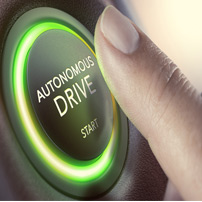How Autonomous Vehicles Make Driving Decisions
March 15, 2017 According to the auto industry, autonomous vehicles are the wave of the future. Research has shown significant reductions in traffic-related injuries and fatalities, as well as notable improvements in efficiency and safety. However, some consumers question whether these vehicles are too good to be true. Despite the benefits, consumers have ethical concerns about how these vehicles will be programmed to respond to a potentially life-threatening scenario.
According to the auto industry, autonomous vehicles are the wave of the future. Research has shown significant reductions in traffic-related injuries and fatalities, as well as notable improvements in efficiency and safety. However, some consumers question whether these vehicles are too good to be true. Despite the benefits, consumers have ethical concerns about how these vehicles will be programmed to respond to a potentially life-threatening scenario.
In response to these valid concerns, researchers from the University of California, Irvine, MIT Media Lab in Cambridge, Massachusetts, and the Toulouse School of Economics in France created a survey that participants can fill out online as a way to initiate a conversation and promote productive discussions about self-driving cars. The survey, which is called the Moral Machine, already has over 2.5 million participants from over 160 countries. The survey encourages people to express their concerns about the algorithmic decisions that vehicles are able to make and whether or not they are ethically sound.
Researchers hope to identify participants’ moral priorities in certain situations where a self-driving vehicle must make potentially life-or-death decisions. In the survey, participants are presented with thirteen different scenarios in which there will be a minimum of one fatality. Victims may be passengers in the vehicle, pedestrians, or even pets. Humans are characterized by a series of traits, including sex, age, overall health, and social status. Participants then asked to share their opinion on how they think the car should react in that situation.
Understanding How Ethics Motivates Consumers
An assistant professor of psychology and social behavior at the University of California, said that they are hoping to get a better understanding of what people’s moral priorities are when they are asked to weigh the value of one person’s, or animal’s, life against another. For example, the survey is designed to provide insight into whether people prefer that the car save the greatest number of people versus a single person who is deemed more worthy. Scenarios explore difficult decisions such as whether the car should save the lives of its passengers over the lives of other drivers or pedestrians, or if the car should favor passengers based on age, prioritizing young lives over old lives. These are all questions the researchers hope to have answered.
The survey results are tabulated based on a sliding scale of how strongly each participant feels about their response. For example, when answering questions about saving more lives, protecting passengers, and avoiding intervention, respondents responses ranged from “does not matter” to “matters a lot.” Other question topics included gender, age, species, and social value. The site tabulates the responses of all previous participants, allowing people to compare their ethical intuitions to others.
Because of the ethical issues connected to autonomous cars, this research provides valuable insight into how society feels about these vehicles, including trust issues and an overall willingness to purchase a self-driving car in the future.
Baltimore Car Accident Lawyers at LeViness, Tolzman & Hamilton Represent Victims of Accidents Involving Autonomous Vehicles
If you or a loved one is injured in a car accident involving a self-driving vehicle, you are urged to contact the highly respected Baltimore car accident lawyers at LeViness, Tolzman & Hamilton as soon as possible. To schedule a free consultation, call us today at 800-547-4LAW (4529) or contact us online.
Our offices are located in Baltimore, Columbia, Glen Burnie, and Towson, allowing us to represent car accident victims in Maryland, including those in Anne Arundel County, Carroll County, Harford County, Howard County, Montgomery County, Maryland’s Western Counties, Southern Maryland, and the Eastern Shore, as well as the communities of Catonsville, Essex, Halethorpe, Middle River, Rosedale, Gwynn Oak, Brooklandville, Dundalk, Pikesville, Nottingham, Windsor Mill, Lutherville, Timonium, Sparrows Point, Ridgewood, and Elkridge.






